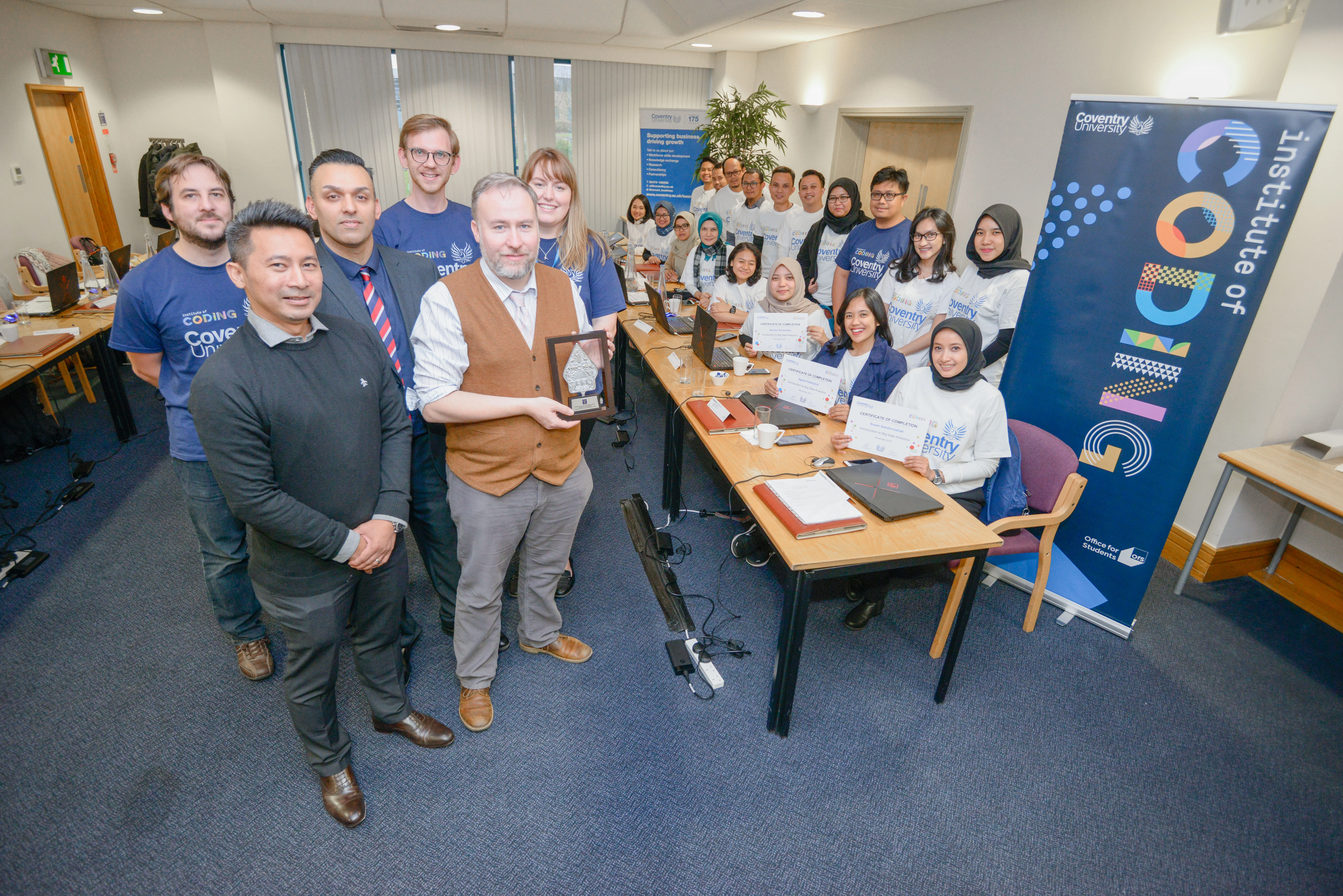
Partner Article
IoC selected ahead of leading universities to provide digital skills training
Coventry University was chosen ahead of universities from across the country to partner on an innovative new collaboration with the Indonesian Ministry of Law and Human Rights amid increasing demand in the digital skills sector.
The ground-breaking partnership saw delegates from the Ministry travel from Indonesia to Coventry University to receive training from the University’s Institute of Coding’s (IoC) team of digital sciences experts.
The IoC is a national consortium that creates learning opportunities designed to prepare learners for a future in which digital skills are paramount: from courses for learners beginning their journey, to those changing careers or keeping-up with transformations in their industry.
Coventry University leads the consortium’s work on “Digitising the Professions”, an initiative which addresses the digital skills needed in industry sectors in light of the digital revolution.
It was that expertise which prompted the Indonesian Ministry to opt for IoC at Coventry University over other high-profile institutions.
Jovie Pebrihandono, Regional Business Development Executive, Coventry University Indonesia Office, said: “The Directorate General Legal Administrative Affairs Ministry of Law and Human Rights In Jakarta, had been looking for an international educational institution that could deliver an introductory course on data.
“They have a lot of data in their Ministry which they want to use to support their current policy or even to develop a new policy, which is why they requested the training.”
The Ministry approached the Indonesian Embassy in London and asked for their suggestions on arranging a week’s worth of digital science training from an acclaimed institution in the UK.
The Embassy contacted several leading universities across the country, but only the IoC at Coventry University was able to deliver on all of their requirements.
Deepak Farmah of the Institute of Coding, Coventry University, said: “We spent a lot of time analysing the Ministry’s requirements and were able to tailor a programme that met all of their needs.
“We took care of all aspects of the course. We provided support in obtaining visas and helped them to organise transport to and from Indonesia. We also assisted them in finding accommodation and arranging local visits here in Coventry. This meant the Ministry’s delegation was able to focus solely on the course.
“By the end of the week, the students had developed skills which are hugely relevant to today’s world and which can be applied to jobs across a range of sectors.
“We are very proud that the Ministry chose the IoC at Coventry University during what is a very important period for the digital sciences field.”
The collaboration is the latest milestone for the IoC, which is experiencing high demand for data science, Internet of Things and Blockchain skills.
The programme, which is led by James Shuttleworth, Associate Professor in Cybersecurity at Coventry University, provides students with a grounding in the basics of data science and encourages them to consider how to map these skills to their current roles.
James said: “We are seeing a huge amount of interest from the UK and abroad for courses that help people that traditionally didn’t need digital skills learn the things that are going to make a difference in their long-term career, and from organisations that want to maintain the viability of their workforce as industries undergo digital transformation.”
The collaboration with the Indonesian Ministry of Law and Human Rights is the first of many international collaborations the IoC is hoping to attract in the coming months – all of which are expected to raise the profile of digital sciences and frontier technologies learning at Coventry University.
“The West Midlands industrial strategy very clearly puts the focus on a lack of skills and a lack of training and the interesting thing is that those skills that are missing are from the people who we wouldn’t necessarily expect.
“For example, in the automotive sector, there’s growing use of virtual and augmented reality starting to be seen in various places, but when you talk to smaller organisations, they don’t even know where to start.
“The IoC is helping to bridge that gap to get people over that first hurdle across the West Midlands and now – following our partnership with the Ministry of Law and Human Rights, Jakarta – throughout the world.”
This was posted in Bdaily's Members' News section by Matt Joyce .








 Navigating the messy middle of business growth
Navigating the messy middle of business growth
 We must make it easier to hire young people
We must make it easier to hire young people
 Why community-based care is key to NHS' future
Why community-based care is key to NHS' future
 Culture, confidence and creativity in the North East
Culture, confidence and creativity in the North East
 Putting in the groundwork to boost skills
Putting in the groundwork to boost skills
 £100,000 milestone drives forward STEM work
£100,000 milestone drives forward STEM work
 Restoring confidence for the economic road ahead
Restoring confidence for the economic road ahead
 Ready to scale? Buy-and-build offers opportunity
Ready to scale? Buy-and-build offers opportunity
 When will our regional economy grow?
When will our regional economy grow?
 Creating a thriving North East construction sector
Creating a thriving North East construction sector
 Why investors are still backing the North East
Why investors are still backing the North East
 Time to stop risking Britain’s family businesses
Time to stop risking Britain’s family businesses